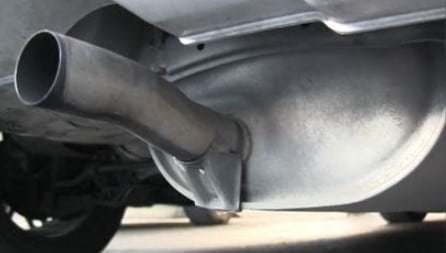As you drive around your car, there are explosions happening inside the engine every second, yet you hear only a toned-down sound from the exhaust. The reason behind this is your car’s muffler. A muffler is responsible for many key functions in your vehicle and it is interesting to learn how it works and how its regular maintenance can maximize your vehicle performance.
How does a muffler function?
When you drive your car around, its engine produces a lot of pulsating noise. This happens due to the exhaust valves opening up and releasing extremely pressurized gas. The sound travels to the exhaust pipe where this noise grows louder. Here, the muffler plays its role of minimizing the noise produced by the high-pressure gas.
Muffler is a cylindrical device installed in line with the exhaust pipe. Inside the muffler, there are chambers and perforated tubes that help reduce the engine noise. When high frequency sound waves travel to the muffler, they bounce against different chambers. This causes the waves to create an opposing sound that cancels the original sound out. When this happens, the exhaust continues to flow outward. Mufflers can be designed in different ways to produce a specific kind of noise. So, if you like your car to make the fast and furious kinds of noise, you can find a muffler to do that for you.
Another important function of the muffler is that it helps maximize the vehicle’s overall performance, When the muffler works to expel exhaust from pipes, it also takes oxygen from fresh air in order to generate more power. The faster this process occurs, the more efficiently the vehicle will run. So, a high functioning exhaust flow can ensure efficient performance of your vehicle.
In short, mufflers play an important rile in regulating engine noise and allowing the vehicle to perform to its maximum efficiency, so it is crucial that it is always in excellent condition.
Muffler maintenance
Typically, mufflers can last 5-7 years in most US vehicles. However, mufflers can become worn out prematurely due to several reasons. Exposure to salt is a common reason behind muffler damage. The vehicle may be exposed to sea water in communities located near the ocean or to salt on roads that are snowy or icy. If the vehicle is frequently hit due to pot holes or speed bumps, the muffler can get damaged. Excessive use can also cause premature wear and tear.
If there is a problem with the muffler, your vehicle will exhibit a few symptoms. Here are some warning signs that may indicate a problem with the muffler.
Loud exhaust noise
If your exhaust is louder than usual, it could be due to an exhaust leak, which usually occurs in the muffler. As we explained earlier, the muffler has a series of chambers and perforated tubes that help reduce the noise coming through the exhaust. When the muffler has a hole in it or becomes damaged, it can cause the exhaust to leak and increase the sound coming from the exhaust system.
Misfiring engine
In order for the engine to work properly, all the components should work efficiently. If the exhaust system, which starts at the exhaust valve chamber, exhaust headers, exhaust pipes, catalytic converter, muffler and the exhaust pipes is not functioning well, it can impact the vehicle performance and cause engine misfiring. So, when the muffler has a leak or hole and is not functioning efficiently, it can cause engine misfiring.
Poor fuel economy
An efficient exhaust system with a fully functioning muffler can contribute to better fuel economy. If you notice a drop in your vehicle mileage, it is better to have your vehicle checked by a technician to find out the exact cause.
Rust caused by condensation
Mufflers are prone to rust due to build-up of condensation, Whenever the vehicle is running, everything heats up. When the vehicle is not in use, the engine cools down from being run and the moisture in t he aur condenses inside the muffler and the exhaust pipe. Over time, this moisture build-up can damage the shell of the muffler and it can begin leaking noise and exhaust gases. If you notice condensation leaking from the exhaust pipe, it could be a sign of muffler damage.
If you notice any of these warning signs in your vehicle, you should immediately have it checked by a professional.


